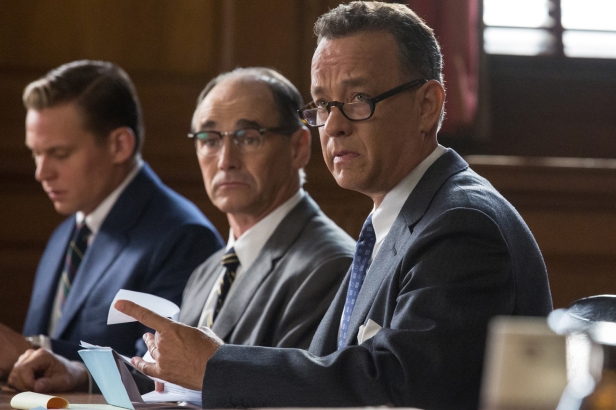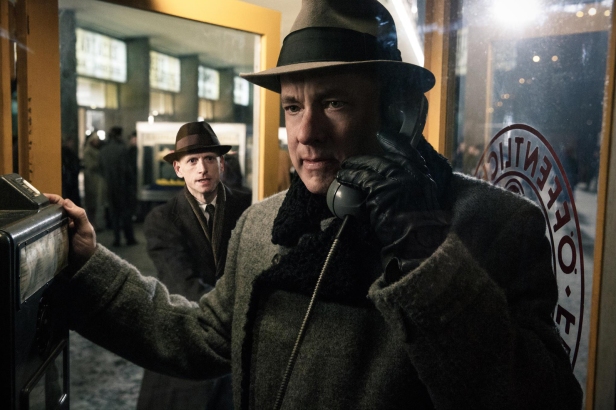Bridge of Spies (2015)
In the shadow of war, one man showed the world what we stand for.
Steven Spielberg’s latest Cold War drama, Bridge of Spies, opens with a superbly crafted near-wordless sequence, where we meet Rudolf Abel (Mark Rylance), a gentle amateur painter living in Brooklyn, New York. Transfixed to the screen, viewers watch as FBI agents trail Abel — a suspected Soviet spy — through the meticulously recreated streets of mid-20th-century New York, before he is finally apprehended in his apartment — which is full of spiffy surveillance gear — and charged with both treason and espionage. But this is America, so even a KGB spy is entitled to a fair trial, right?

Enter Thomas Watters (Alan Alda), the attorney who’s given the tedious duty of defending Abel. With his apparent lack of passion for the case, Watters handballs the job over to his junior partner James B. Donovan (Tom Hanks), a darn good insurance lawyer who hasn’t taken on a criminal case in years, much less one that’s this high-profile or politically charged. Going against the grain, Donovan believes that his client is entitled to the best defense he can provide and, as a consequence, is rejected by his workmates, questioned by his wife (Amy Ryan), and most alarmingly, shunned by the judge (Dakin Matthews), who’s about to listen to the case. You see, while everyone believes that Abel should get the electric chair, Donovan is resolute on taking Abel’s case all the way to the Supreme Court if needs be. During this time, Donovan and Abel’s relationship grows, ultimately blossoming into a moving friendship that essentially becomes the heart of the film.
Donovan’s main argument for sparing Abel’s life is his belief that the British-born Russian could serve as potential collateral for an American hostage if anything were to happen with the Soviet Union somewhere down the line. Such an incident presents itself several years later in 1960, when a U.S. pilot, Francis Gary Powers (Austin Stowell) is shot down in his U-2 spy plane during a mission in Russia and is thrown into a harsh Soviet prison. The very next year, another American, a student named Frederic Pryor (Will Rogers) — who’s dating an East German girl — finds himself on the wrong side of the newly built Berlin Wall and is also arrested, held without any charge by the East German police. Now, without any official recognition from the U.S. government, Donovan is flown to Berlin on behalf of his client Rudolf Abel and entrusted with the sole task of negotiating Francis Gary Powers’ release. Donovan, however, is determined to get both young Americans freed in exchange for his ‘one’ high-value prisoner Abel, even if he must go over the CIA to do so.

As a film, Bridge of Spies can be split into two distinct parts; the first sees the clandestine Donovan fight for Abel in New York, his negotiating skills made evident, whilst the second sees this very same man sent to Berlin, where he takes multiple trips (by himself) back and fourth across the Berlin Wall to negotiate two separate deals; one with a top KGB agent for Powers’ return, and the other with a very Western East German lawyer named Wolfgang Vogel (Sebastian Koch) for the return of Pryor. Driven by ethical and political standoffs, opposed to physical action, Bridge of Spies makes for a genuinely gripping espionage thriller, one that’s coated with layers of subtext, particularly how events from half century ago virtually mirror or share certain parallels with today’s paranoia over the Muslim world.
Enriched by the slickly written, well-researched screenplay, freely adapted from historical records by Joel and Ethan Coen, No Country for Old Men (2007), and British writer Matt Charman, Suite Française (2014), Bridge of Spies simplifies some overly complex issues and makes them somewhat accessible while retaining a sense of wit, which stops the flick from becoming a tedious history lesson or a cheap manipulation piece. All the while, Bridge of Spies proves that director Steven Spielberg, Saving Private Ryan (1998), still knows exactly how to compose a frame, creating shots that are not only wonderful to marvel at but vital to the ideas or emotions that he’s trying to put forward; scenes at the Glienicke Bridge — which links West Berlin with Potsdam, a common spot for prisoner swaps from which the movie takes it’s title — are exceptional, both visually and narratively.

Furthermore, the flick looks terrific thanks to the amazing optics by Janusz Kaminski, Schindler’s List (1993), who’s cinematography has become a Spielbergian benchmark within itself, and the fantastic production design by Adam Stockhausen, 12 Years a Slave (2013), with detailed and accurate portrayals of both Brooklyn and East Berlin during the late 1950s and ‘60s. Shots depicting a society consumed by Red-Scare fever are excellent, no doubt sharing a personal connection with Spielberg, who grew up in The Golden Age of Television.
In his fourth collaboration with Spielberg, the always-compelling Tom Hanks, Forrest Gump (1994), makes for the ideal James Donovan, with Hanks honing in on the character’s quick-witted nature and all-round every-man charisma. Channeling the homely allure of say, James Stewart or Spencer Tracy, Hanks’ entirely convincing performance should earn him an Oscar nomination for Best Actor. Equally as impressive is Mark Rylance, The Other Boleyn Girl (2008), with the veteran stage actor delivering an outstanding performance as the balding British-born Soviet spy Rudolf Abel who, given his limited dialogue, exhibits the character’s humanity and warm enigmatic charm. Bridge of Spies is also blessed with a solid support cast; Amy Ryan, Gone Baby Gone (2007), does a great job as Donovan’s loving wife Mary whereas Scott Shepherd, Brief Reunion (2011), hams it up as CIA operative Hoffman.

But I digress, as Bridge of Spies is only weighed down by Spielberg’s familiar wholesomeness, which often feels a little schmaltzy. Then there are the picture’s final ten or so minutes, with its coda being needlessly stretched, thankfully though, the flick concludes on a rather bittersweet note.
At the end of the day, Bridge of Spies exists as an assured example of contemporary Hollywood filmmaking, marking yet another near classic from director Spielberg. An engrossing tale about an ordinary man placed in extraordinary circumstances, Bridge of Spies delivers a romanticized look at tradecraft, political principals and hardy moral, with this riveting fact-based docudrama standing as a tremendous tribute to both its real-life heroes and the filmmaker’s mastery.
4 / 5 – Recommended
Reviewed by Mr. Movie
Bridge of Spies is released through 20th Century Fox Australia
Good review. Spielberg makes this material work plenty. It’s not a great movie, but it’s a fine one that’s worth the watch.
Great review for what I think is one of the best movies of 2015 thus far. I recently did a podcast review of that same movie on my blog page and YouTube channel. Here’s the link to check it out, and feel free to leave a comment or two.
https://legallyblack.wordpress.com/2015/10/20/bbb-podcast-6-knock-knock-beasts-of-no-nation-bridge-of-spies-reviews/